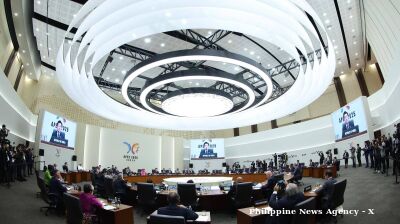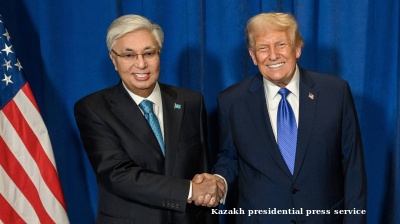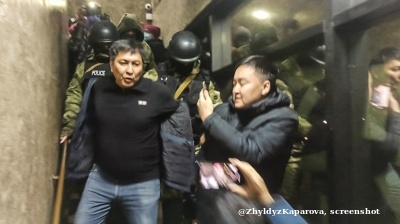Olaf Scholz concluded his first visit to Central Asia as German chancellor with a September 17 “5+1” regional summit in Kazakh capital Astana attended by the region’s five leaders.
At the summit with the presidents of Kazakhstan, Uzbekistan, Turkmenistan, Tajikistan and Kyrgyzstan, Scholz highlighted Germany’s deepening ties with Central Asia. “Never before has the exchange between our societies been so close, and it is constantly increasing: politically, economically and culturally. We want to continue and further intensify this,’’ he said.
“Especially in times of global uncertainty, we need close, trusting international partners,’’ he added.
With Russia distracted by its war in Ukraine and economic struggle against international sanctions, other major powers have spent the past two years attempting to raise their influence in, and trade and investment links with, post-Soviet Central Asia. Prior to the Scholz trip, the region had already seen visits from the leaders of countries including China, France and South Korea in relatively quick succession. Japan lately cancelled a scheduled visit of its prime minister at the last minute due to a tornado emergency, while the top diplomats of the US and UK have also toured Central Asian capitals since the outbreak of the Ukraine conflict and Central Asia’s leaders a year ago attended a first-ever joint meeting with the US president in New York.
Scholz flew into Uzbekistan on September 15 and departed for Kazakhstan on September 16. On that first day of Scholz’s visit to Central Asia’s largest economy, Kazakh President Kassym-Jomart Tokayev and Scholz discussed the war in Ukraine. Tokayev called for peace talks, stating that Russia “cannot be defeated in the military sense”, while Scholz emphasised that Ukraine was defending its sovereignty, while reminding that the conflict was sparked by Russia’s invasion.
In seeking closer economic ties between Germany and Kazakhstan, Scholz on September 16 made a point of saying that expanded trade must not help Russia bypass EU sanctions.
He highlighted Kazakhstan’s role in partly replacing Russia as a key oil supplier to Germany, particularly t0 Berlin’s Schwedt refinery, and stressed the mutual benefits of increasing trade in oil, rare earths, lithium and other critical raw materials (CRM). Scholz, notably, offered to process Kazakhstan’s raw materials locally, creating more economic benefits for Kazakhstan.
Tokayev said, in turn, that Kazakhstan aims to boost its supply of CRM to Germany.
The Kazakh leader discussed plans to establish a trade consortium with Germany for rare earth elements (REE) and welcomed the development of a $500mn lithium mine by HMS Bergbau in eastern Kazakhstan. He also noted that Kazakhstan holds 19 of the 34 CRMs identified as essential.
"We expect the establishment of a trade consortium for rare earths," said Tokayev.
He also noted that his country was ready to start exporting more oil to Europe.
"Seventy percent of our oil exports go to the European Union. We are prepared to further develop our export potential and make our contribution to alleviating energy deficits," Tokayev said.
Germany has emerged as a significant trade and investment partner for Kazakhstan. Kazakh authorities noted that trade between the two countries grew by 13% y/y in the first seven months of this year to $2.3bn. German investments in Kazakhstan saw a sharp rise last year, increasing by 64% to reach $770mn, with much of the funding directed towards Kazakhstan’s non-extractive industries, in line with the nation’s goal of diversifying its economy.
Also on day two of Scholz’s visit, Tokayev invited Germany's scientific and educational institutions to strengthen cooperation in key areas such as artificial intelligence (AI), digitalisation and green technologies.
Business communities from the two nations held a joint business forum on the same day, which featured the signing of 36 agreements that could be worth $6.3bn if potential is realised. They covered industries such as engineering, logistics, petrochemicals and healthcare.
Highlights from the Kazakh-German Business forum included an agreement signed between Siemens and Kazakhstan's National Welfare Fund Samruk-Kazyna to localise the production of measuring and electrical equipment, as well as industrial automation systems, in Kazakhstan.
As such, a new joint venture will be established, focusing on local assembly and eventual production of Siemens’ measuring equipment.
Siemens also signed a separate agreement with Kazakhstan’s Silk Road Electronics to produce automation and electrification equipment for the metallurgical industry and energy infrastructure.
Also at the forum, German logistics company Rhenus SE & Co KG signed a memorandum with the Caspian Sea Port of Aktau and Kazakhstan Railways to build a trimodal container terminal by 2030. This terminal will enhance supply chain connectivity between Kazakhstan, Europe and the Southern Caucasus via the Caspian Sea.
Additionally, Kazakhstan’s Ministry of Transport and the Kazakh-German consortium SKYHANSA signed an agreement to build a cargo-passenger airport in the Khorgos-Eastern Gate Special Economic Zone (SEZ), near the Kazakhstan-China border. The SEZ, located on the Western Europe–Western China highway and the Trans-Caspian International Transport Route (TITR), includes a dry port and logistics hub.
The airport will have a passenger terminal that can serve up to 500 people per hour, a cargo terminal with a capacity of 250,000 tonnes annually and additional facilities. The project is valued at over $500mn and is to create 300 permanent jobs, with construction set to begin after an investment agreement is finalised.
The leaders of Kyrgyzstan and Tajikistan used the summit occasion to press Scholz for German investment in their plans for major hydropower expansions that will simultaneously address electricity deficits and contribute in the drive for net zero.
News

US–China soybean sales restart
According to Scott Bessent, US Treasury Secretary, the agreement marks a significant step towards restoring normalcy for American farmers.

Russia faces $50bn annual losses from oil sanctions as Lukoil exits international assets
Russia is expected to lose at least $50bn annually due to oil-related sanctions, as Moscow’s largest private oil producer Lukoil agrees to sell its international assets and Germany considers nationalising operations owned by state-run Rosneft.

Chicken and chips in Seoul - for Nvidia, Samsung and Hyundai
In a low-key fried chicken shop in southern Seoul, the leaders of Nvidia, Samsung Electronics and Hyundai Motor held an informal meeting on the evening of October 30.

Presidents Lee and Xi begin diplomatic chapter at APEC summit
President Lee, who is chairing the first session of the summit at the Hwabaek International Convention Centre, stood at the entrance to personally welcome participants. President Xi reached the venue at approximately 10:02.




